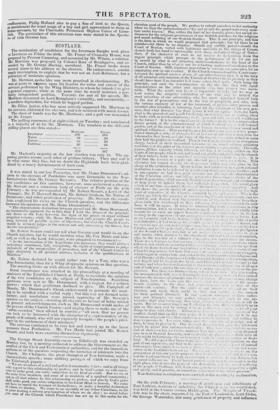It was stated in our last Postscript, that Mr. home
Drummond's ad- dress to the electors of Perthshire was more favourable to the Non- Intrusionists than Mr. George Stewart's. The relative position of the two candidates on this question, however, soon underwent a change. Mr. Stewart met a numerous body a electors at Perth on the 28th February ; he was accompanied by Mr. Robert Steuart, a Lord of the
Treasury, Mr. P. Maxwell Stewart, Mr. Robert Graham, Mr. Nairne of Dunsinane, and other gentlemen of property. Mr. Stewart, the candi- date, explained his views on the Church question, and the difference between his opinions and Mr. Home Drummond's- " The characteristic distinction between myself and. Mr. Home Drummond, my honourable opponent, lit.; in this, that I hold the fitness of the principle laid down in the Veto Act—viz. the right Di' the people to reject without assigning reasons; while Mr. Home Drittnicoild only permits the people to bring forward all possible species of objections, but that the Church Courts Aould be ultimate judges in the matter, not only concerning the fitness, but also the acceptability."
Mr. Robert Steuart could not tell what Government would do on the Church question, but he would mention what Mr. Fox Motile and him- self, as well as the Lord Advocate, were prepared to recommend-
. As the intervention of the Legislature was necessary, they would advise a declaratory enactment, fully recognizing the rights of congregations to judge exclusively of the acceptaldlity of presentees, and of the Church Courts to judge absolutely in all spiritual matters, ihelasive of the qualifications of Ministers."
Mr. Nairne declared he would rather vote for a Tory, who was a Non-Intrusionist, than for a Whig of opposite opinions on that question. The meeting broke tip with cheers for Mr. Stewart.
Great importance was attached to the proceedings at a meeting of ministers of the Established Church at Perth, to ascertain the opinions of the two candidates on the subject of Non-Intrusion. Searching questions were sent to Mr. Drummond, with a request for a written answer; which that gentleman declined to give. Mr. Campbell of Monzie, Mr. Drummond's friend, endeavoured to persuade the meet- ing to he satisfied with a verbal reply'. but this was not deemed sat's- l'actory, and resolutions were passed, approving of Mr. Stewart's opinion on the subject—warning all electors to beware of being misled
by general acknowledgments, soch as Mr. Drummond would make, of
the powers of the Church Courts—and urging them to make use of the "noble occasion" then offered to convince "all men, that no person can look to be honoured with the character of a representative of the people of Seotland, who will not expressly recognize the people's privi- leg,es in the settlement of their ministers."
The canvass continued to be very hot and earnest up to the latest accounts from Perthshire. Mr. Fox 3Ianle had joined Mr. Robert teuart, and both were exerting themselves vigorottsly.


























 Previous page
Previous page